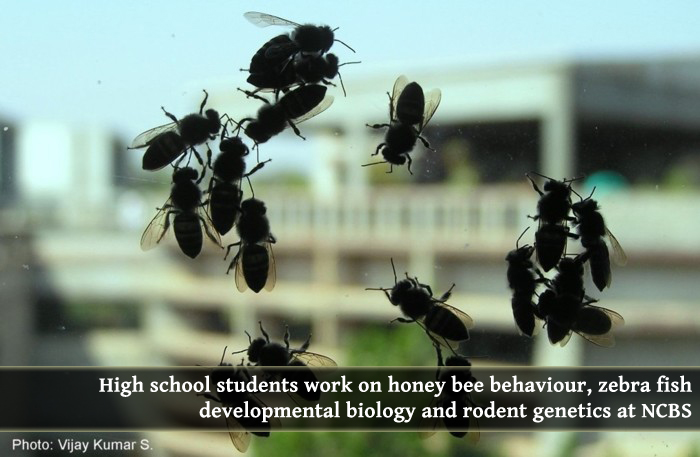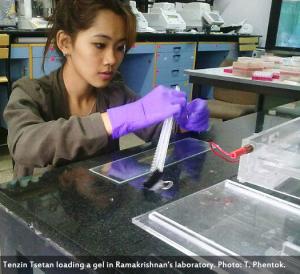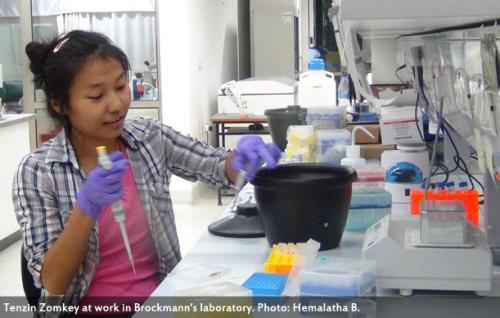Tibetan high school students intern at NCBS
Three Grade 12 students from the Central School for Tibetans at Mundgod in Karnataka are currently interning at the National Centre for Biological Sciences (NCBS). Following an agreement with their school and the NCBS, Tenzin Tsetan, Tenzin Phentok and Tenzin Zomkey began their internship on 6th May with Professors Uma Ramakrishnan, Vatsala Thirumalai and Axel Brockmann.
This is the first time the students have observed how scientific research is conducted and they are very excited. "It's been wonderful," says Zomkey. At the start of their internships, professors assigned each high school student to a mentor - a researcher who would guide their ward through the basic concepts and methods of science in their laboratories. These mentors have played an important role in the program. "From the very start, they told us everything from the basics," says Zomkey. Phentok, who hails from the Tibetan settlement in Kollegal in Karnataka agrees. "We never had to ask for help, they offered help even without us asking," she says. Working in Thirumalai's lab and guided by Lena Robra, Phentok got a peek into the basics of the neurogenetics of the zebra fish as it develops from egg to adult. Tsetan, who worked with Krishnapriya Tamma in Ramakrishnan's lab, learned about DNA extraction and the stories it can unfold. "It initially looked so complicated, but my mentor did it easily," says Tsetan. "I learnt how to extract DNA from rodent tissue - from their tails and ears. After I extracted DNA from them, I sent it for sequencing to see if all the species were from the same place, whether their ancestors are the same, and to check if they have undergone speciation," she says. Tough-sounding concepts have been broken down to simpler, understandable terms - this is obvious from the information that Phentok, Tsetan and Zomkey seem to have gleaned from their interactions with the scientists.
The professors in whose labs they interned have also enjoyed interacting with the high school students. Brockmann has been following Zomkey's progress in his lab and is very happy with his new student. "With honey bees, students can do hands-on experiments. They can catch honey bees and look at them. Honey bees are a nice system for outreach," adds Brockmann. Zomkey has already dissected her first bee brain, caught bees and trained them, in preparation for behavioural experiments. "I have also learnt RNA isolation techniques," she says.
The girls' interest in science is apparent. Will they pursue science as a career, I ask. "Of course!" comes the immediate answer. "And we will encourage others to take it up too," says Tsetan.
This kind of encouragement is precisely what this program hoped for. The internship that the three students have been part of is a pilot program, a first attempt at helping the Tibetan community promote science education among Tibetan residents in India. Among others, Ronald Vale, Professor at the Department of Cellular and Molecular Pharmacology at the University of California (San Francisco), was instrumental in setting up the program. "I met the Minister of Education of the Tibetan Government in Exile once in San Francisco, and later visited their community in Dharmashala," he says. "I saw what they were trying to do with their whole education program and it was quite interesting. Both the Dalai Lama and the Government are very interested in promoting science and science education." Vale, along with NCBS Centre Director Satyajit Mayor and L. S. Shashidhara (Professor and Coordinator of Biology at IISER Pune) hatched this program that could introduce high school students from the Tibetan community to scientific research as-it-is-practised now. Three students have also been invited to IISER Pune to intern there during their winter break in December 2013.
"This is the first time ever in 53 years that we could offer an internship opportunity for our students in a research laboratory where they could interact with scientists - thanks to NCBS and Professor Vale for making it happen," says Jamyang Gyaltsen, Education Officer in the Central Tibetan Administration's Department of Education. Nearly 23,000 Tibetan children are currently being educated in 76 schools across India, under the aegis of the Department of Education. "The under-performance of our children in Science and Maths is one of the key challenges that we have been facing in the field of education. Every year, only about 20% of the Tibetan students graduating from Grade 10 opt for science and the number further drops after finishing Grade 12. Consequently, the Tibetan community utterly lacks professionals and specialists in the field of science," says Gyaltsen. He hopes that the program will motivate high school students to choose the sciences.
"We'll see how it goes and if it's successful then maybe it can be a regular program. It could be something that actually has a real long-term benefit for the Tibetan community in India," adds Vale. Brockmann feels that once established, it would be nice to extend this education and outreach program to students outside of the Tibetan community as well. "I think being exposed to how researchers do science is the best way to learn science," he says.



Comments
Post new comment